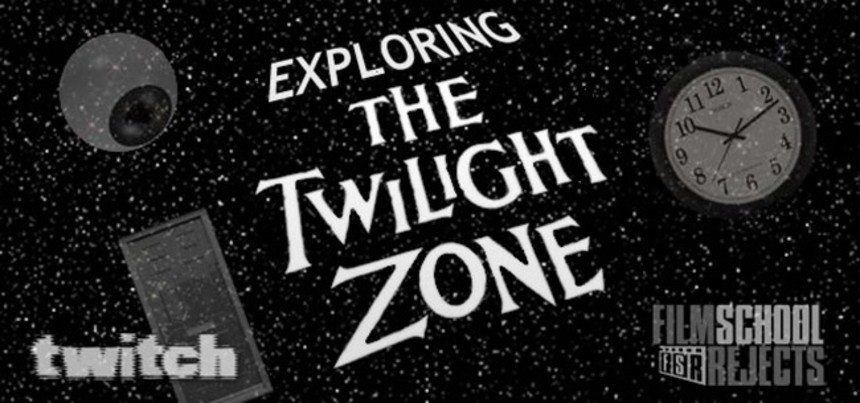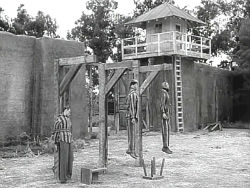Exploring The Twilight Zone, Episode #74: "Deaths-Head Revisited"

An unrepentant SS officer returns to Dachau, the scene of his many crimes, and is forced to confront his past -- and his victims.
The Twilight Zone, Episode #74: "Deaths-Head Revisited" (original air date November 10, 1961)
The Plot: A stranger (Oscar Beregi) stalks into a hotel lobby and asks for a room. The innkeeper (Karen Verne) stares at him; he looks familiar. Then her countenance changes to fear as she places the face. The stranger says he doesn't know what town he's in. The woman tells him: "Dachau."
Rod Serling informs us that the stranger is, in fact, SS Captain Gunther Lutze, a man who took sadistic pleasure in the pain of others. Lutze heads to the abandoned concentration camp to relive old glories. As he struts like a peacock around the desolate place, however, he is surprised to be greeted by a man dressed in the ragged uniform of a prisoner.
The man's name is Becker (Joseph Schildkraut), and he was, indeed, imprisoned in the camp during World War II. He proceeds to call Lutze out for his multitude of wicked, murderous sins. He also informs Lutze that he is to stand trial for the crimes he committed. Lutze is convinced the other man has lost his marbles, until he is brought to a room and confronted with the sight of all the tortured souls that he killed, all ready to pass judgment on him.

The Goods: Even when the plot is straightforward and the story feels, 50 years later, overly familiar due to so many subsequent iterations of the same basic idea, Serling's language is so rich, eloquent, and precise that it demands attention. That's certainly the case here; the heat of infuriated anger steams off the screen.
There's a specific reference to Nuremberg, which might lead one to think that this episode, which aired a little more than one month before Stanley Kramer's Judgment at Nuremberg, represented Serling's thoughts about the Nuremberg trials, and the judgments rendered, and that he wanted to get them into the public consciousness before Kramer's even-tempered version had a chance to become accepted doctrine.
But it's much more likely that the trial of Adolf Eichmann, which began in Israel on April 14, 1961, weighed more heavily on Serling. Eichmann sat inside a bulletproof glass booth during the trial; in his defense, it was argued that he was only "following orders." The trial ended on August 14, but the verdict -- guilty on all counts -- was not announced until December 11, and his death sentence not pronounced until December 15. Eichmann was hanged on May 31, 1962.
One can imagine Serling sitting up late at night, smoking, and contemplating a just punishment for Eichmann's crimes.
The Trivia: Per IMDB: "The title refers to the Totenkopf or Death's Head symbol used by the SS during World War II depicting a skull and crossbones. It is distinguished from similar traditions of the skull and crossbones and the Jolly Roger by the positioning of the bones directly behind the skull."
On the Next Episode: "When the Earth falls out of orbit, two women try to cope with increasingly oppressive heat in a nearly abandoned city."
Catching up: Episodes covered by Twitch | Episodes covered by Film School Rejects
We're running through all 156 of the original Twilight Zone episodes, and we're not doing it alone! Our friends at Film School Rejects have entered the Zone as well, only on alternating weeks. So definitely tune in over at FSR and feel free to also follow along on Twitter accounts @ScreenAnarhcy and @rejectnation.







